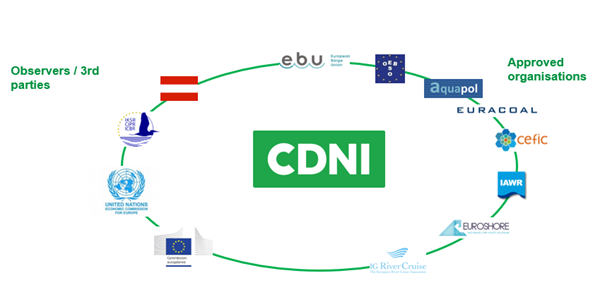The six Contracting States cooperate closely with the approved organisations, who represent their sector’s interests, and who are affected by the CDNI’s activities.
The approved organisations can make their thoughts and questions known at a dedicated hearing every two years, but also regularly during meetings of the CDNI/G working group and International Clearance and Coordination Body (ICCB). These approved organisations are internationally representative.

The Contracting parties also have close ties with other international organisations.
A first meeting between Danube Commission experts and their CDNI counterparts took place on 31 October 2018 in Vienna. The Danube basin is also paying sustained attention to managing vessel waste and shares the realisation that better management and disposal of inland navigation waste is only possible at international level. This being so, the Danube States, who have been offered initial status as observers, have for some years now been looking at the desirability of joining the CDNI or the potential benefit of further harmonising requirements.
Cooperation with the International Commission for the Protection of the Rhine (ICPR), and especially the exchange of technical expertise, is beneficial. The CDNI’s contribution to the decline in contamination attributable to illegal discharges of MTBE-ETBE by the navigation sector has also been highlighted in the ministerial communique of the ICPR’s 15th ministerial Conference on the Rhine (28 October 2013, Basel).
The United Nations Economic Commission for Europe (UNECE) ensures the harmonisation of its waste management recommendations with those of the CDNI (within the European Code for Inland Waterways – CEVNI). Harmonised provisions at international level encourage a common interpretation beyond the scope of the CDNI.
These activities were supported by a joint meeting between the CEVNI experts Group and the CDNI Secretariat (8 February 2019), and by bilateral exchanges.
In its White Paper on the efficiency and viability of inland waterway transport in Europe (published in February 2020), the UNECE cites the CDNI as being the benchmark legal framework: it promotes the creation of uniform and binding regulations for Europe as a whole, ideally based on the CDNI model.
Furthermore, when it comes to inland navigation, the European Commission explicitly refers to the CDNI in its regulatory framework for waste from seagoing vessels (see recital 22 of Directive (EU) 2019/889 of 17 April 2019).
The CDNI also ensures implementation of uniform regulations that are compatible with European and international law. The Implementing Regulation refers to the applicable European directives.
Finally, the Contracting Parties endeavour to act transparently, beyond the circle of insiders, by means of public consultations based on the Aarhus Convention.
CONVENTION ON THE COLLECTION, DEPOSIT AND RECEPTION OF WASTE GENERATED DURING NAVIGATION ON THE RHINE AND OTHER INLAND WATERWAYS
